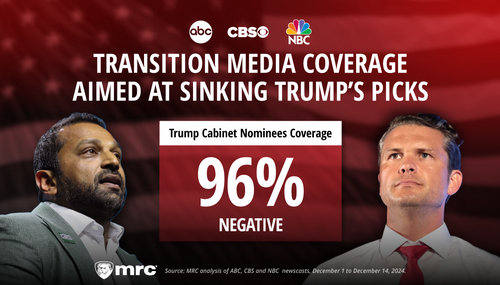MSNBC, the network that has never seen a "Trump is coddling our enemies" angle to a story it did not indulge, took time on Tuesday to blame President Trump and the U.S. for the deteriorating situation in Iraq as pro-Iranian militia elements and their supporters besieged the U.S. embassy in Baghdad Tuesday evening Baghdad time.
MSNBC Live guest host Geoff Bennett began by citing U.S. airstrikes as the reason for the situation, "These American airstrikes in the region, they resulted in the most serious political crisis in years for the U.S. in Iraq, you got them stoking anti-Americanism, potentially giving an advantage to Iran in its competition for influence in Iraq." The fact that those airstrikes were the result of Kata'ib Hezbollah killing an American contractor had already been reported on, but still quickly brushed aside.
After Washington Post White House correspondent Anne Gearan eagerly agreed: "Yeah, absolutely Geoff, you see the great power competition here between the United States and Iran taking place in Iraq which, I mean is absolutely caught squarely in the middle. They are-- live next door to Iran, we don't and Iranian influence in Iraq goes back hundreds of years and in the current context, decades."
Bennett turned to Obama-appointed Ambassador to Iraq Christopher Hill, who reliably whacked Team Trump: "Well, my biggest concern is I think the U.S. government has a kind of cartoon image of what is happening in that part of the world. And essentially it’s to blame Iran for everything."
Yes, because Iran supports the group that just killed an American, has attacked merchant ships, bombed Saudi oil facilities, fomented civil war in Yemen, and arms Hamas. The real cartoon image of Iran is pretending that this started when Trump decided to withdraw from the nuclear deal, or that the nuclear deal made it better.
Still, Hill went on to say that Iran is a "very malign influence in Iraq," but then circled back to blaming Trump, "But I think the question that needs to be asked is: does the U.S. government have any policy worthy of the name? Is blaming Iran for everything going to suffice?"
He then questioned the wisdom of the airstrikes, "Is the idea that we’re going to go attacking from the air—I mean these were F-16s dropping this ordinance, these Iraqi staffed, albeit Iranian-backed militia groups." They were F-15s, but that aside, Hill then questioned the Administration's intelligence. "One has a sense that this is heading to no better place, and of course the Administration has zero interest in any kind of real diplomatic negotiation with the Iranians apart from demanding a kind of tactical surrender on their part. So, these are tough times and one worries whether or not the Administration has the horsepower and brain power to deal with them."
Here is a transcript for the December 31 show:
MSNBC
MSNBC Live
9:02 AM ET
GEOFF BENNETT: These American airstrikes in the region, they resulted in the most serious political crisis in years for the U.S. in Iraq, you got them stoking anti-Americanism, potentially giving an advantage to Iran in its competition for influence in Iraq.
ANNE GEARAN: Yeah, absolutely Geoff, you see the great power competition here between the United States and Iran taking place in Iraq which, I mean is absolutely caught squarely in the middle. They are-- live next door to Iran, we don't and Iranian influence in Iraq goes back hundreds of years and in the current context, decades. That predates the U.S. invasion of Iraq and predates the U.S. relationship with the current Iraqi government by a good bit. Iraq is an ally of both Iran and the United States, consider how difficult that must be and here we have President Trump laying a lot of responsibility on the Iraqi government, a caretaker government at that as Hans pointed out, saying you should push back, you should not allow this from your next door neighbor Iran, and you Iran blaming the United States for instigating the tension to begin with.BENNETT: Let’s bring in Ambassador Christopher Hill, who served as U.S. Ambassador to Iraq at the embassy from 2009 to 2010, he’s also dean of the University of Denver’s school of international studies. So, Ambassador Hill, what is your biggest concern about you watch what is playing out right now in real-time?
CHRISTOPHER HILL: Well, my biggest concern is I think the U.S. government has a kind of cartoon image of what is happening in that part of the world. And essentially it’s to blame Iran for everything. There is no question that there is an organic relationship between these Shia militia groups and Iran, especially Iran’s Quds Force. It is very maligned influence in Iraq. But I think the question that needs to be asked is: does the U.S. government have any policy worthy of the name. Is blaming Iran for everything going to suffice. Is the idea that we’re going to go attacking from the air—I mean these were F-16s dropping this ordinance, these Iraqi staff, albeit Iranian-backed militia groups. One has a sense that this is heading to no better place, and of course the Administration has zero interest in any kind of real diplomatic negotiation with the Iranians apart from demanding a kind of tactical surrender on their part. So, these are tough times and one worries whether or not the Administration has the horsepower and brain power to deal with them.




